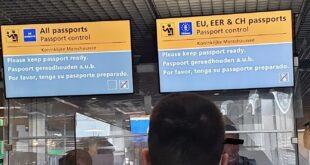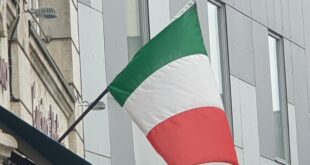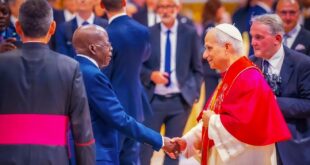Kenneth Gbandi is just concluding its 4-year tenure as president of the German chapter of the Nigerians in Diaspora Organisation (NIDO). The Hamburg-based communal politician, journalist, business consultant and media entrepreneur spoke in an exclusive interview with Femi Awoniyi in Berlin on the challenges facing NIDO, how Nigeria can attract more German investment and how best President Muhammadu Buhari should handle Biafra agitation and the Niger-Delta militants. He also talked about his aspiration to the chair of NIDO Europe and what he plans to do to bring about a more active Diaspora involvement in national development.
How has it been leading NDO in Germany?
It has been a gratifying experience. I feel honoured for the opportunity to serve the organisation. It provided a platform to make an input into the efforts to develop our country. All of our activities were geared towards making an input to national development.
What has your experience these past four years as president of NIDO Germany taught you?
Many lessons! Most importantly though is that if we work together we can achieve great things. There is strength in unity indeed! I am most fortunate to have worked with an executive who put in their very best to ensure that we made a mark. Moreover, the founding fathers of NIDO Germany gave me their unlimited support. And I believe that I can point that out as the secret of our success.
What are the main challenges facing NIDO?
We need more of us to be actively engaged in the organisation. The more members we have, the more influential we will become. I believe any NIDO executive must make it a priority to carry out a membership drive.
President Buhari was recently in Germany. What is your view of the visit?
I think it is positive. Nigeria must continue to engage its international partners. I believe closer bilateral ties between the two countries can only be mutually beneficial.

How can the ties become more fruitful for Nigeria? Let me put it this way, how can we make Nigeria more attractive for German investment?
The peaceful transfer of power last year is a very good advertisement for our democracy. The present government must deepen the democratic system and ensure the rule of law while maintaining peace and stability.
Two, the way the government treats investors in the country will also send a message out to the world on if the country welcomes investors or not. This is why the Buhari administration should reject any advice that it should reverse the privatisation of the electricity sector. If that happens, it will show that Nigeria lacks respect for contract sanctity and that government is inconsistent in its policy. Nobody would like to go to Nigeria to invest there for the long term.
I would like to call on the President to reject such advice. Whatever challenges the investors in the country’s electricity sector are facing should be critically looked into to see how the government can support them to succeed for the sake of our development.
Nigeria is currently in an economic crisis. The naira has lost value drastically thereby adversely affecting our business people. How do you think government can better manage the crisis which was caused by a drastic fall in our export revenues?
I believe the falling value of the naira won’t abate until it is floated. A situation where the official exchange rate is much lower than the parallel market rate can only fuel speculation. The government should take a cue from the Egyptians who allowed their currency to trade freely this week. It is an option we should explore.
Beyond managing the naira’s value, what do you think the government should do tackle the economy?
The main reason for the crisis is simply that we import far more than we export. We export mainly oil and gas. And import virtually everything including even refined petroleum products. So the crisis was only waiting to happen.
Nigeria spends US$22 billion to import food items annually, we spend $7.2 billion to import refined petroleum products. We import textiles and ready-made dresses to the tune of $4 billion in a year. Imagine that there are seven million vehicles on our roads and we do not produce a single tyre for them....
These are things we should be producing and even exporting. So the current crisis is an opportunity to diversify our economy.
For example, the major food items that we import are rice, sugar, wheat, fish, milk and cooking oil. Take rice; there are so many rice belts in the country that, if encouraged, can produce as much rice as we want.
The government should draw up a crash programme to achieve self-sufficiency in these food items in the next five years. It is achievable. Countries like India and Pakistan have proven that it is possible. Self-sufficiency will not only lead to basic food security, create jobs and further social peace but will also spark the development of the agro-allied industries.
Do you think the country is conducive enough to attract investors that it needs to achieve the objectives you have mentioned?
I am not going to be unrealistic; there’re many challenges for any investors to surmount in the country. However, the fact that Nigeria is such a vast market makes it attractive despite these challenges. Moreover, we currently have a President who enjoys enormous goodwill internationally as a man of integrity. Now is the time to leverage this goodwill to attract foreign investment.

What is your assessment of the Buhari administration so far?
The war on corruption is good. No Nigerian will be against fighting corruption except they’re direct beneficiaries. Corruption has really had a terrible impact on the country. However, the war should be fought transparently and in a non-discriminatory manner. There should not be sacred cows. Nobody should be spared because they come from a particular ethno-national group or belong to a particular political party. If the war is selective then it becomes a with-hunt and it will no longer be popular with the people.
We have a separatist campaign by the Indigenous People of Biafra, IPOB, and several militant groups in the Niger Delta are clamouring for local control of their oil and gas resources. Do you think the government has handled these issues correctly?
We should praise the President for meeting the leaders of the Niger Delta at last. However, that meeting should have taken place much earlier than it did. In fact, the President should have met these leaders immediately he was sworn into office to assure them that the outcome of the election that brought him into office was not a loss for the region but a victory for the whole country.
He should have then assured them that his government was committed to the development of the region and that they would not suffer any disadvantages as a result of Jonathan’s loss. If he had done that, we would not have militant groups sabotaging our oil and gas infrastructure today, causing the nation billions of dollars in lost revenue. The President and the Niger Delta leaders should keep the dialogue going and the federal government should sincerely address the legitimate grievances of the region.
What about the Biafra agitation?
I believe the feeling of exclusion leads to such agitation. Of course, other factors could play a role. Feeling of exclusion is the major factor. The best way for the President to defeat such sentiments is to govern fairly and treat the whole country as his constituency. I believe most Nigerians want our country to remain one, but just, peaceful and prosperous. Buhari will gain the support of the overwhelming majority of Nigerians if he is seen to be impartial. Every democratic system functions on the faith of the citizens that the state operates without fear or favour. The president must reemphasize in deeds that he belongs to nobody and belongs to everybody.
Having said that, there are overwhelming majority of Nigeria that believe that there is the need to discuss our current federal structure and if necessary fine tune it. I strongly believe that there is nothing wrong in coming together to discuss our challenges.
You’re aspiring to the chair of NIDO Europe. What are your plans for the organisation?
I believe that the Diaspora has a great role to play in taking Nigeria to where we all desire it to be. At the moment, we don’t have enough opportunities to play that role, which most of us are actually willing to play. There are no clear-cut policies on how to engage the Diaspora in national development, which is one of the goals we must continue to work hard to achieve. I am thinking of a National Diaspora Policy and a Diaspora Commission.
Just few days ago, Prof Mahmood Yakubu, the Chairman of the Independent National Electoral Commission, said in an interview that he was in favour of the Diaspora voting and promised to continue to work with the National Assembly and the Diaspora towards its actualization. I support that move.
Generally, I plan to engage government at all levels in Nigeria to make the right policies and create institutional structures for a greater Diaspora involvement in development.
 THE AFRICAN COURIER. Reporting Africa and its Diaspora! The African Courier is an international magazine published in Germany to report on Africa and the Diaspora African experience. The first issue of the bimonthly magazine appeared on the newsstands on 15 February 1998. The African Courier is a communication forum for European-African political, economic and cultural exchanges, and a voice for Africa in Europe.
THE AFRICAN COURIER. Reporting Africa and its Diaspora! The African Courier is an international magazine published in Germany to report on Africa and the Diaspora African experience. The first issue of the bimonthly magazine appeared on the newsstands on 15 February 1998. The African Courier is a communication forum for European-African political, economic and cultural exchanges, and a voice for Africa in Europe.
































